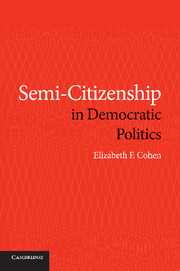Book contents
2 - The Myth of Full Citizenship
Published online by Cambridge University Press: 02 February 2010
Summary
INTRODUCTION
Citizenship is an essential element of democracy and a universal feature of the modern state. Scholars study citizenship laws to learn who is welcome in a society; they study the rights and responsibilities of citizenship to learn how citizens are governed in democracies; and they study citizen behavior to learn how people govern themselves. All this presumes that we know what citizenship is and who has it. Yet who is, and is not, a citizen is often difficult to determine. Like a host of related political concepts, citizenship is both essential and essentially contested. While there exists a wealth of qualitative work examining specific elements of, and phenomena associated with, citizenship, there is little consensus on the meaning of the term. In the absence of any conceptual discipline, the term “citizenship” has come to mean many things to many people. This is a problem that results both from the type of investigations of citizenship that are currently popular, and from formal obstacles to defining something like citizenship. Taken collectively, the contestations and impasses that persist in discussions of the concept of citizenship highlight the need to develop a theory of semi-citizenship, and simultaneously to point out ways to develop this theory.
The second section of the chapter discusses three facets of disagreement about the notion of citizenship. The first of these is generated by contestation over where the authority to define citizenship is located.
- Type
- Chapter
- Information
- Semi-Citizenship in Democratic Politics , pp. 13 - 58Publisher: Cambridge University PressPrint publication year: 2009

